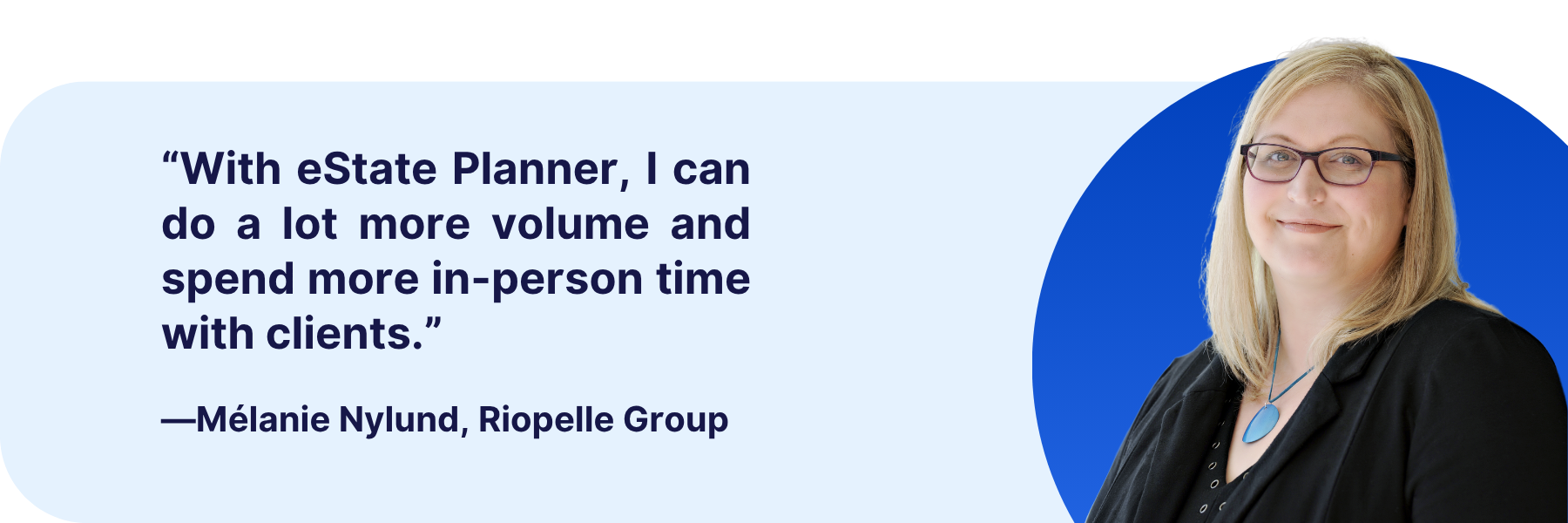Starting an estate practice, whether fresh out of law school or by adding this specialty to your established practice areas, can be both rewarding and complex. The wills and estates area offers meaningful work, long-term client relationships, and a steady demand for services. But it also requires meticulous attention to detail, well-established processes, and effective risk mitigation management.
Drawing from decades of experience in this area and interactions with hundreds of estate lawyers, here are practical steps to build a successful wills and estates practice in today’s environment.
Master the intake process
In 2025, the top priority for estate lawyers is delivering a superior client experience. And that begins with a solid intake process.
According to hundreds of lawyers we surveyed earlier this year, most lawyers now use questionnaires—with digital forms proving most effective.
- 80% of lawyers using online forms report satisfaction with the quality of client input
- Paper forms? Just 57% are satisfied

Pro Tip
Collect not just personal and family info, but also client instructions on executors, guardians, and distribution goals. That way, planning meetings can focus on advice—not just data collection.
To help you establish solid intake processes, we’ve developed a client intake form template. Visit this page to download it for free.
Reduce administrative overhead
The average will file takes 5 hours to complete—but firms using document automation tools often cut that to under 3 hours. This reduction translates to faster turnaround times, allows more valuable time for addressing clients' unique estate planning needs, and delivers a superior client experience.
Tools like eState Planner help:
- Dynamically draft and update wills and other legal documents using peer-reviewed precedents
- Improve client understanding of their wills through visual representations of their asset distribution and estate plan
- Create different planning scenarios in just a few clicks, helping lawyers guide their clients effectively
eState Planner also reduces the risk of missing information—one of the top causes of claims against estate lawyers—through its unique legal alert feature.

Build a client-driven referral pipeline
While some assume that financial professionals are the best source of estate planning work, recent survey data tells a clearer story.
Top sources of estate planning clients in 2025:
- 50%: Existing clients for whom lawyers provide other services (family law, real estate, corporate)
- 32%: Referrals from past estate planning clients
- 12%: Advertising
- 1.85%: Referrals from other lawyers
Translation: Your best business comes from people who already trust you. If you do family, real estate, or corporate work, estate planning is a natural extension. And a satisfied estate client often refers a sibling, friend, or colleague when the topic of wills comes up.

Client referral strategies that work:
- Ask for referrals at file closing, when satisfaction is highest
- Stay in touch with periodic check-ins or newsletters
- Offer a will review every few years
- Promote estate planning across your other practice areas
Communicate clearly (and visually)
More than 80% of today’s lawyers conduct client meetings the traditional way, mostly relying on verbal communication and using pen and paper. But keep in mind that clients often struggle to understand complex planning decisions this way. Ensuring that your clients fully understand how their estate plan works goes a long way.
To enhance client communication and ensure mutual understanding, try:
- Flowcharts or software-generated visuals
- On-screen walkthroughs of distribution plans
- Provide graphic summaries to help client understanding of asset distribution

eState Planner's users can generate graphic summaries to help clients understand their asset distribution.
Last year, 40% of claims against estate lawyers were due to inadequate investigation or poor documentation. Here are some tips to mitigate those risks:
- Using a consistent client intake checklist
- Keeping detailed notes (ideally typed or transcribed)
- Sending clear reporting letters at file closing
Bonus: Offer to register your clients’ wills
One of the first challenges families and executors face when an individual passes away is locating the deceased’s most recent will. If it’s lost, misplaced, or presumed revoked, it can cause delays, family conflict, or even litigation. By registering your clients’ wills with an online registry, you ensure that its existence—and location—is discoverable when it matters most.
For lawyers, this simple step reduces the risk of being blamed for a “missing will” and supports your duty to protect client property. It also shows clients that you’re thinking ahead on their behalf. Registration is often inexpensive—and even free for eState Planner users—quick, and often as simple as sharing your client file information (not the actual file) to the registry.
Amongst the will registries available, Onwills—featured on the LSO website—is Ontario’s premier will registry. In addition, eState Planner users can register wills at no cost.
Final thoughts
Becoming a successful estate lawyer isn’t just about drafting airtight documents. It’s about creating a process that’s efficient, transparent, and client-friendly.
By focusing on communication, leveraging the right tools, and maximizing the potential of your existing client base, you can grow a practice that’s both sustainable and satisfying—for you and your clients.
Ready to elevate your practice? Book a demo to see how eState Planner can improve your estate planning practice.



